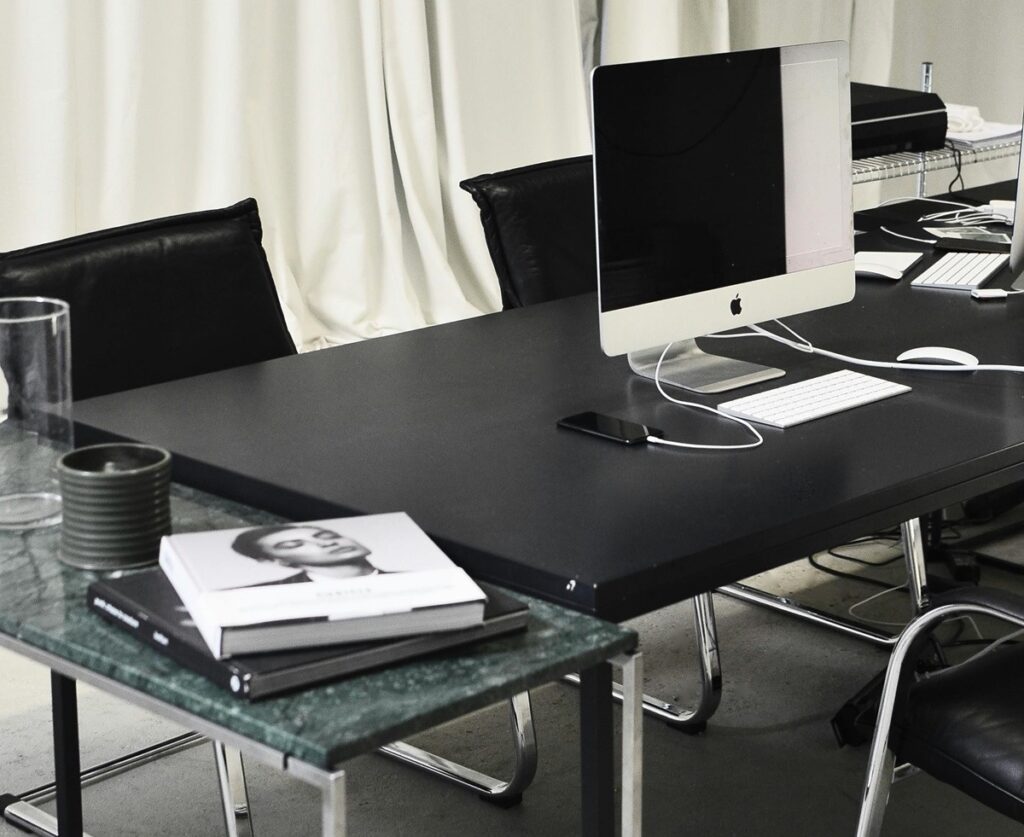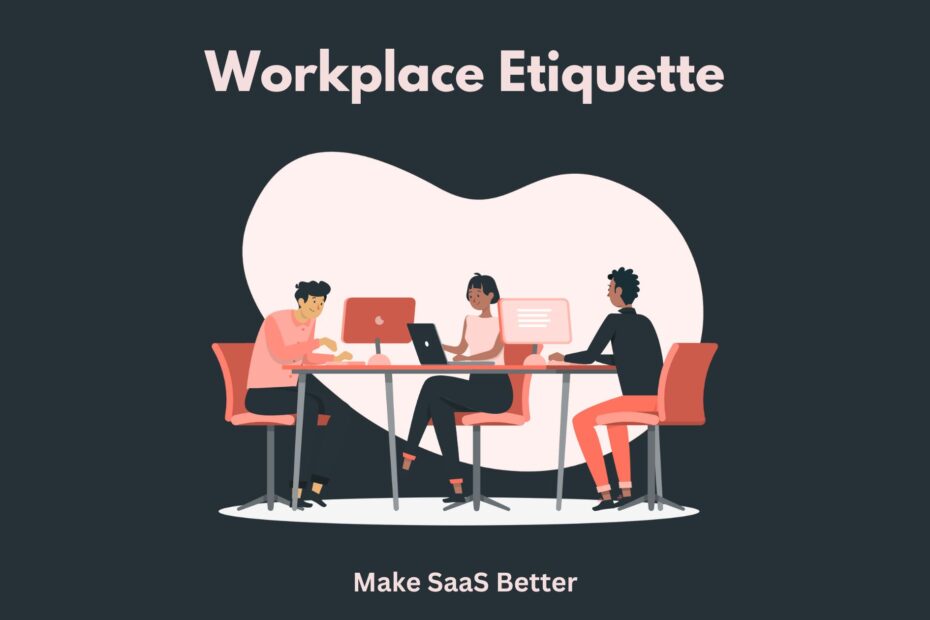More than 60% of companies plan to implement etiquette courses for their employees.
This demand for workplace etiquette has increased due to the shift from a completely remote work routine during the pandemic to a hybrid work culture.
Doing so ensures that the employee’s behavior helps them be more productive at the office and can establish a good reputation, helping in their overall success at work.
Learning workplace etiquette and knowing about basic behavioral expectations also helps to collaborate with colleagues, create a spirit of community, develop relationships, and enhance morale.
Let’s take a look at how this happens…
What Is Workplace Etiquette?
Workplace etiquette or professional etiquette is like a set of unwritten rules about how a professional is expected to behave for their profession and career development.
It’s about being professional and respectful towards your colleagues, supervisors, and clients. It can be things like how you dress, how you communicate, and how you manage your time.

Following all these creates a smooth working environment where everyone feels comfortable and can be productive. The workplace etiquette might also vary depending on the company culture, country, and profession.
I have created a list of 11 basic workplace etiquette tips you can follow at work. Let’s take a look at each of them one by one.
11 Workplace Etiquette Tips to Follow at Work
1. Be Punctual
Always aim to arrive at your workplace a few minutes early for meetings and work shifts.
This demonstrates respect for your colleagues’ time and sets a professional tone. It also gives you a buffer in case of unexpected delays, such as traffic jams or public transportation issues.

If you think you will be late due to any urgency or unexpected changes, communicate the same to your lead, supervisor, and teammates as soon as possible. You can make a quick call or drop an email/message to explain the situation and your estimated arrival time.
This shows consideration, helps maintain a smooth workflow, and prevents confusion or frustration due to uninformed absence.
2. Listen Actively and Speak Respectfully
Active listening is a key communication skill that demonstrates respect and helps ensure understanding.
When someone is speaking, make eye contact, nod your head to show you’re engaged, and avoid interrupting. Pay attention to both the verbal and nonverbal cues of the speaker.
Once they’ve finished their point, take a moment to collect your thoughts before responding. When you speak, use a professional tone and clear, concise language.
Focus on delivering your message in a way that is easy to understand and avoids rambling or negativity. If you disagree with something, phrase your response constructively which offers solutions or alternative viewpoints.
3. Follow the Dress Code and Maintain a Neat Appearance
Your professional image has immense value in the corporate world. This makes looking presentable and dressing as per your company culture important.
Opt for clothes that are clean, ironed, and fit well. Avoid overly casual attire, such as ripped jeans, tank tops, or clothes with offensive slogans or images.

A neat and well-maintained appearance projects professionalism and creates a positive impression on colleagues, clients, and anyone you interact with during the workday.
If your company doesn’t have a specific dress code, it’s always best to dress more formally. This demonstrates that you take your role seriously and are mindful of the overall work environment.
4. Follow Company Policies
It’s important to take some time to get familiar with your company’s handbook and policies.
When you first join the team, you’ll be given an overview of the basic expectations of the organization, and you’ll be assigned courses to help you learn how to use company assets and adhere to the rules.
Make sure to follow all the policies outlined in the handbook that govern the workplace, from the essential guidelines like dress code and internet usage to more specific procedures such as requesting vacation time, submitting expense reports, or handling intellectual property.
By understanding these expectations, you’ll be able to work within the expected boundaries and avoid any misunderstandings. This will also protect you from disciplinary action for being non-compliant and contribute to a more organized work environment.
5. Be Courteous
It’s important to treat everyone with kindness and respect, no matter their job or position. This includes the people you work with, your clients, and vendors.
When we’re polite and friendly, it helps create a positive work environment where everyone feels important. It also helps build good relationships with people outside of our company, which can help us work together better and be more successful.
When we treat others well, it creates a good feeling that can make work more enjoyable for everyone.
6. Keep Work Areas Clean
Maintaining a clean and organized workspace benefits you, your colleagues, and the overall work environment.
A cluttered desk can make it difficult to focus and find things you need, hindering your productivity. Whereas a clean workspace sets a sense of calm and clarity, allowing you to work better.

So, avoid eating at your desk, especially the shared ones, and make sure to remove any used cups, glasses, waste paper, etc before leaving the desk.
Furthermore, keeping shared areas like the cafeteria and break rooms clean shows respect for your colleagues, and the working staff.
7. Respect Work-Life Balance
It’s important to be dedicated to your work, but it’s equally important to maintain a healthy work-life balance.
This involves setting clear boundaries between your work and personal life while also respecting the personal lives of your colleagues. When you need to take a break or won’t be available during work hours, make sure to inform your team beforehand and return on time.
Doing so helps establish trust and prevents unnecessary frustration caused by poor communication among team members.
8. Give and Take Constructive Criticism in a Healthy Way
Feedback is essential for growth, both personally and professionally.
By being open to receiving constructive criticism from colleagues or supervisors, you demonstrate your willingness to learn and improve. When you receive feedback, listen attentively and avoid becoming defensive.
Consider the points being made, and ask clarifying questions if needed. A simple “Thank you for your feedback” acknowledges the other person’s time and effort, and shows that you’re receptive to their input.
Also, delivering constructive criticism is an important skill to have. When offering feedback, focus on specific actions or behaviors, not personal attacks. Frame your criticism in a way that is helpful and actionable.
9. Handle Conflicts Calmly and Professionally
Conflicts and disagreements can happen at work for various reasons.
In such situations, it’s essential to remain calm and handle the problem professionally. Avoid getting angry or attacking the other person personally. Instead, focus on the issue and try to identify its main cause.

Listen carefully to the other person’s point of view and try to understand their perspective, communicate your thoughts clearly, and express your concerns respectfully.
If you find it challenging to resolve the conflict on your own, don’t hesitate to seek help from your seniors or HR to calm the situation.
10. Practice Confidentiality
Practicing good confidentiality creates a culture of trust within the workplace and protects the company’s valuable assets.
Respect sensitive information entrusted to you by the company or colleagues. This includes client data, financial records, internal discussions, trade secrets, intellectual property, and any information designated as confidential.
Be mindful of what you discuss in public spaces. Avoid leaving confidential documents unattended on your desk or screen. Don’t share confidential information via email, text message, or social media unless it’s encrypted and sent to authorized recipients.
When in doubt, be cautious and consult with your supervisor or the IT team about the best way to handle sensitive information.
11. Put an Effort To Know People
Building positive relationships with colleagues goes beyond simply being polite. It also means taking the initiative to get to know the people you work with can benefit you.
Start by making an effort to learn people’s names and address them in conversation even when working remotely or in a hybrid work culture. This simple gesture shows that you are attentive and value them as individuals.
Also, try to discover their interests and hobbies. This not only helps you find common ground but also sets a deeper sense of understanding and appreciation for your colleagues.
When people feel seen and heard, it improves morale and creates a more positive work environment.
Mastering The Skills of Workplace Etiquettes
Following these 11 workplace etiquette tips can significantly enhance your professional experience. From punctuality and professionalism to respecting boundaries and effective communication, these guidelines will help you navigate the workplace with confidence and make a positive impression on everyone you interact with.
Check out some more related articles –
12 Fun and Creative Employee Engagement Activities for 2024
The Ultimate Guide to Effective Remote Collaboration in 2024

